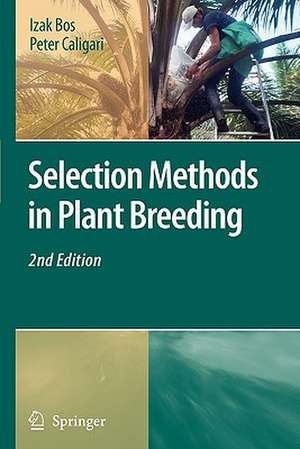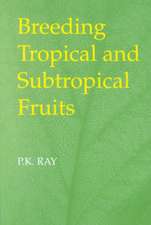Selection Methods in Plant Breeding
Autor Izak Bos, Peter Caligarien Limba Engleză Paperback – 10 noi 2010
| Toate formatele și edițiile | Preț | Express |
|---|---|---|
| Paperback (1) | 1552.05 lei 6-8 săpt. | |
| SPRINGER NETHERLANDS – 10 noi 2010 | 1552.05 lei 6-8 săpt. | |
| Hardback (1) | 1555.83 lei 6-8 săpt. | |
| SPRINGER NETHERLANDS – 14 noi 2007 | 1555.83 lei 6-8 săpt. |
Preț: 1552.05 lei
Preț vechi: 1892.74 lei
-18% Nou
Puncte Express: 2328
Preț estimativ în valută:
296.97€ • 310.10$ • 245.24£
296.97€ • 310.10$ • 245.24£
Carte tipărită la comandă
Livrare economică 15-29 aprilie
Preluare comenzi: 021 569.72.76
Specificații
ISBN-13: 9789048176168
ISBN-10: 9048176166
Pagini: 476
Ilustrații: XII, 461 p.
Dimensiuni: 155 x 235 x 25 mm
Greutate: 0.66 kg
Ediția:Softcover reprint of hardcover 2nd ed. 2008
Editura: SPRINGER NETHERLANDS
Colecția Springer
Locul publicării:Dordrecht, Netherlands
ISBN-10: 9048176166
Pagini: 476
Ilustrații: XII, 461 p.
Dimensiuni: 155 x 235 x 25 mm
Greutate: 0.66 kg
Ediția:Softcover reprint of hardcover 2nd ed. 2008
Editura: SPRINGER NETHERLANDS
Colecția Springer
Locul publicării:Dordrecht, Netherlands
Public țintă
ResearchCuprins
Population Genetic Effects of Cross-fertilization.- Population Genetic Effects of Inbreeding.- Assortative Mating and Disassortative Mating.- Population Genetic Effect of Selection with regard to Sex Expression.- Selection with Regard to a Trait with Qualitative Variation.- Random Variation of Allele Frequencies.- Components of the Phenotypic Value of Traits with Quantitative Variation.- Effects of the Mode of Reproduction on the Expected Genotypic Value.- Effects of the Mode of Reproduction on the Genetic Variance.- Applications of Quantitative Genetic Theory in Plant Breeding.- Selection for Several Traits.- Genotype × Environment Interaction.- Selection with Regard to a Trait with Quantitative Variation.- Reduction of the Detrimental Effect of Allocompetition on the Efficiency of Selection.- Optimizing the Evaluation of Candidates by means of Plots.- Causes of the Low Efficiency of Selection.- The Optimum Generation to Start Selection for Yield of a Self-Fertilizing Crop.- Experimental Designs for the Evaluation of Candidate Varieties.
Textul de pe ultima copertă
Written for plant breeders, researchers and post-graduate students, this book provides a comprehensive review of the methods and underlying theoretical foundations used for selection in plant breeding programmes. The authors review basic elements of population and quantitative genetic theory, and consider in a unique way the tackling of the problems presented by soil heterogeneity and intergenotypic competition when selecting quantitative characters.
The efficacy of different methods with regard to developing new varieties of crops are discussed for different modes of reproduction.
This work provides a sound basis for informed decision making within the process of a selection programme.
The efficacy of different methods with regard to developing new varieties of crops are discussed for different modes of reproduction.
This work provides a sound basis for informed decision making within the process of a selection programme.
Caracteristici
Concise text on population and quantitative genetic theory Comprehensive treatment of selection methods for qualitative and quantitative traits Extensive treatment of problems due to soil heterogeneity and intergenotypic competition


